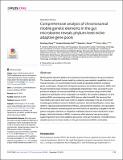Comprehensive analysis of chromosomal mobile genetic elements in the gut microbiome reveals phylum-level niche-adaptive gene pools
Author(s)
Jiang, Xiaofang; Hall, Andrew Brantley; Xavier, Ramnik J.; Alm, Eric J.
DownloadPublished version (2.935Mb)
Publisher with Creative Commons License
Publisher with Creative Commons License
Creative Commons Attribution
Terms of use
Metadata
Show full item recordAbstract
Mobile genetic elements (MGEs) drive extensive horizontal transfer in the gut microbiome. This transfer could benefit human health by conferring new metabolic capabilities to commensal microbes, or it could threaten human health by spreading antibiotic resistance genes to pathogens. Despite their biological importance and medical relevance, MGEs from the gut microbiome have not been systematically characterized. Here, we present a comprehensive analysis of chromosomal MGEs in the gut microbiome using a method that enables the identification of the mobilizable unit of MGEs. We curated a database of 5,219 putative MGEs encompassing seven MGE classes called ImmeDB. We observed that many MGEs carry genes that could confer an adaptive advantage to the gut environment including gene families involved in antibiotic resistance, bile salt detoxification, mucus degradation, capsular polysaccharide biosynthesis, polysaccharide utilization, and sporulation. We find that antibiotic resistance genes are more likely to be spread by conjugation via integrative conjugative elements or integrative mobilizable elements than transduction via prophages. Horizontal transfer of MGEs is extensive within phyla but rare across phyla, supporting phylum level niche-adaptive gene pools in the gut microbiome. ImmeDB will be a valuable resource for future studies on the gut microbiome and MGE communities.
Date issued
2019-12-12Department
Massachusetts Institute of Technology. Department of Biological Engineering; Massachusetts Institute of Technology. Department of Civil and Environmental Engineering; Massachusetts Institute of Technology. Center for Microbiome Informatics and TherapeuticsJournal
PLoS one
Publisher
Public Library of Science (PLoS)
Citation
Jiang, Xiaofang et al. "Comprehensive analysis of chromosomal mobile genetic elements in the gut microbiome reveals phylum-level niche-adaptive gene pools." PLoS one 14 (2019):e0223680 © 2019 The Author(s)
Version: Final published version
ISSN
1932-6203
Keywords
General Biochemistry, Genetics and Molecular Biology, General Agricultural and Biological Sciences, General Medicine